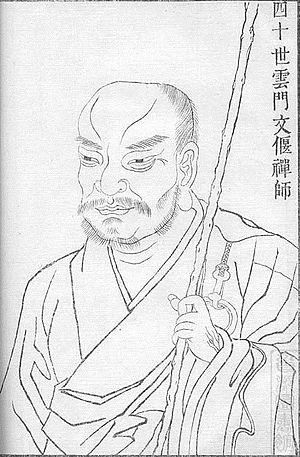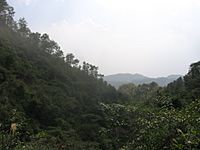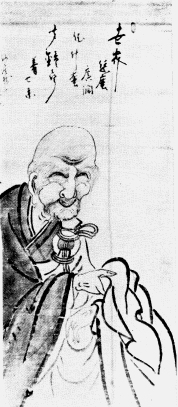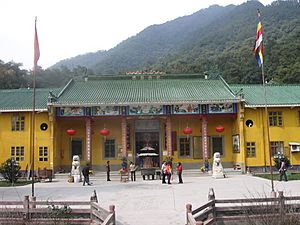Yunmen Wenyan facts for kids
Quick facts for kids Yúnmén Wényǎn |
|
|---|---|
 |
|
| Religion | Buddhism |
| School | Ch'an |
| Personal | |
| Nationality | Chinese |
| Born | 862 or 864 Jiaxing, Tang dynasty |
| Died | 949 Yunmen Temple, Guangdong, Southern Han |
| Senior posting | |
| Title | Ch'an-shih |
Yunmen Wenyan (Chinese: 雲門文偃; pinyin: Yúnmén Wényǎn; romaji: Ummon Bun'en; 862 or 864 – 949 CE) was a very important Chinese Chan master. Chan Buddhism is also known as Zen Buddhism. He lived during the Tang dynasty in China.
Yunmen was a "dharma-heir" of Xuefeng Yicun. This means he was chosen by Xuefeng Yicun to carry on his teachings. Yunmen started his own school of Zen, called the Yunmen school. It was one of the five main schools of Chan Buddhism. The school got its name from the Yunmen monastery where he was the head monk.
The Yunmen school became very popular, especially among important people. Its teachings were even collected in a famous book called the Blue Cliff Record. Later, the Yunmen school joined with another school called the Linji school. However, Yunmen's teachings are still followed today by masters like Hsu Yun (1840–1959).
Contents
Yunmen's Life Story
Early Life and Becoming a Monk
Yunmen was born in a town called Jiaxing, near Shanghai, around 864 CE. When he was a boy, he became a monk. He studied under a teacher named Zhicheng in Jiaxing. He took his vows to become a full monk when he was 20 years old, in 883 CE.
Yunmen felt he needed to learn more. So, he went to study with another teacher named Muzhou Daozong. Muzhou Daozong was very old, about 100 years old! He told Yunmen to go visit the most famous Chan master of that time, Xuefeng Yicun. Yunmen followed this advice. He traveled to Fuzhou and studied with Xuefeng Yicun for several years. There, he had a deep spiritual experience called "enlightenment."
Becoming a Respected Master
Even after becoming enlightened, Yunmen didn't immediately become the head of a monastery. He traveled around China, visiting many monasteries. This helped him become known as a great Chan master.
Around 911 CE, Yunmen joined a monastery led by Rumin Chanshi in Guangdong. They became good friends. When Rumin Chanshi passed away in 918 CE, Yunmen became the new head monk of that monastery.
At this time, China was going through many changes. The Tang dynasty was weak, and different parts of the empire broke away. The area where Yunmen lived became a peaceful kingdom called the Southern Han. The ruler of this kingdom, Liu Yan, often asked Rumin Chanshi for advice. When Rumin died, Liu Yan met Yunmen.
Leading the Yunmen Monastery
Liu Yan was very impressed with Yunmen. He offered Yunmen his support and confirmed him as the new head of the monastery. But Yunmen became so famous that too many visitors came. It was hard for him to focus on his teachings.
So, in 923 CE, Yunmen asked the king for help. He wanted to build a new, quieter monastery on Mount Yunmen. The king agreed. Five years later, when Yunmen was 64, he moved to the new monastery. This is where he taught and became known by the name of the mountain: Yunmen.
The king and some of Yunmen's students tried to give him more important jobs and honors. But Yunmen always said no. He preferred to stay at his monastery and teach.
His Final Days
Yunmen passed away peacefully in 949 CE. He sat in a special meditation pose called the "lotus posture." He was buried with great respect. Years later, his body was moved in a special parade. His monastery was given a new name, and stone tablets were put up to tell his life story. People honored his body for many centuries, until it disappeared during a time of trouble in the 20th century.
After Yunmen, Dongshan Shouchu became the head monk of the monastery. Yunmen's most important student was Baiyun Zixiang, who started his own temple nearby.
Yunmen's Teachings

How steep is Yün-mên's mountain!
How low the white clouds hang!
The mountain stream rushes so swiftly
That fish cannot venture to stay.
One's coming is well-understood
From the moment one steps in the door.
Why should I speak of the dust
On the track that is worn by the wheel?
— Yun-men, from the Jingde Chuandeng Lu
《景德傳燈錄》
Yunmen's teachings are sometimes described as "difficult to understand." One expert said that his way of teaching was "indirect." It was like talking about the south but looking at the north.
One-Word Answers
Yunmen was famous for giving very short, sharp, one-word answers to questions. For example, if a monk asked a deep question, Yunmen might just say "Guan!" This word means "barrier" or "frontier pass." These short answers were called "Yunmen's One Word Barriers."
Koans and Famous Sayings
Yunmen created many "koans." A koan is a puzzling story or question used in Zen Buddhism to help students reach enlightenment. He is one of the most important sources of these koans, along with Zhaozhou Congshen. Many of his koans were collected in a book called Yúnmén kuāngzhēn chánshī guǎnglù.
Here are some examples of his koans:
- A monk asked Yunmen, "What is the teaching that goes beyond the Buddha and the great masters?"
- Yunmen said, "A sesame bun."
- (From the Blue Cliff Record, case no. 77)
- A monk asked Yunmen, "What is Buddha?"
- Yunmen said, "Dried shitstick."
- (From case no. 21, The Gateless Gate)
Many of Yunmen's sayings are found in other famous Zen books, like the Book of Equanimity and The Gateless Gate.
Yunmen's Legacy

Yunmen had a huge number of students, supposedly 790! Many of them also became enlightened. The Yunmen School was one of the "Five Schools" of Zen for about 300 years. Later, it became part of the Linji school.
However, Yunmen's teachings are still alive today. Masters like Hsu Yun (1840–1959) continued his lineage. Hsu Yun even rebuilt the Yunmen Temple. The Yunmen school continues through his students and their students, even in places like America.
Yunmen's teachings influenced many later Zen masters. For example, the famous monk Ikkyū had an important enlightenment experience while studying one of Yunmen's koans. Another master, Shuho Myocho, also had a great enlightenment after thinking about a Yunmen koan for ten days. His teacher even called him "the second Ummon" (Yunmen).
One of Yunmen's most famous sayings is "Nichinichi kore kōnichi" which means "Every day is a good day." This phrase has been used by many Zen teachers. Even the modern composer John Cage used this saying in one of his musical pieces!
 | Roy Wilkins |
 | John Lewis |
 | Linda Carol Brown |


